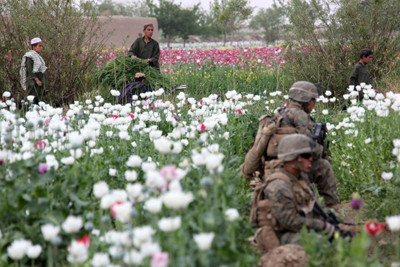By Emma Graham-Harrison
Afghanistan's booming narcotics trade risks splintering the country into a "fragmented criminal state" if the government and its western allies do not step up efforts to tackle opium production, a senior UN official has warned.
Opium farming in Afghanistan, the world's main producer of the drug, hit a record high this year, with farmers harvesting a crop worth nearly $1bn (£610m) to them, and far more to the traffickers who take about four-fifths of the profit.
Jean-Luc Lemahieu, outgoing head of the UN office on drugs and crime in Afghanistan, believes opium production is likely to soar beyond this year's record levels before it falls – and that the transformation of the country's corrupt economy will take up to two decades.
"If we are not careful then Afghanistan has a real risk of becoming a fragmented criminal state," Lemahieu told the Guardian after five years grappling with corruption and neglect of the narcotics problem in Afghanistan.

U.S. marines hold in place while a group of Afghan boys tend poppy crops during a security patrol from their patrol base in Helmand province’s Green Zone, west of the Nahr-e Saraj canal, April 7, 2011.
"One thing we have learned from the last decade is that the miracle solutions just do not work. They simply do not exist. This will be hard work, long work, that demands a lot of persistence and courage. The remedy is known, the medicine is on the table – all we have to do is take it."
Lemahieu said there was cause for hope in the transformation of the narcotics police into a disciplined and relatively well-connected force, and in the government's reluctant crackdown on powerful officials linked to the drug trade, including the arrest of a top police officer.
The trade ties together the Taliban and many of the corrupt officials inside Afghanistan whose bank accounts were swollen by the western contracting dollars handed out on the back of the military occupation, Lemahieu said.
As that money dries up they are looking for other sources of cash to pay off patrons or prospective supporters. The government recently arrested the police chief of western Nimroz province; its long and porous border with Iran is one of the main smuggling routes out of the country.
"This is about the illicit economy taking over the future of a country in which you have invested 12 years," Lemahieu said.
"You cannot separate this out as something from one side or another. Not all in the Taliban are happy about the drug business, but undeniably many of them are involved. Not all in the government applaud the corruption and the drug business, but undeniably many are involved. And the ones who are involved on both sides know each others' phone numbers, they find each other."
With presidential elections looming next year, and parliamentary polls after that, many government officials are relying on the trade for unorthodox campaign finances, Lemahieu said.
"At this moment there is more opium being produced in Afghanistan than is required for the outside market ... the boom in the opium market is one of speculation," he said. "There is no saying it will decline with all the insecurity plaguing Afghanistan, and besides that the political market hasn't calmed down. There is a need for a lot of money."
But the Taliban are also more reliant on poppies for financing than ever before, as conflict in the Arab world sucks away donations that once poured into their coffers.
The international community must force Afghanistan to make drug reduction a priority, after a decade of shying away from it. It is still not on a list of "national priority programmes", and counter-narcotics are barely mentioned in documents laying out aid priorities for Kabul and its backers over the next decade.
Change must involve slow work with communities that grow opium, offering them improvements in quality of life to compensate for the dropoff in income that is an inevitable result of ending drug production, said Lemahieu, who helped co-ordinate a successful reduction in opium cultivation in Burma before moving to Afghanistan.
No other crop can match the financial returns, but in a sign that development and curbing the trade are linked, far more children are in school in areas where there is no poppy harvest than in farming communities that cultivate the drug.
"If you can work on other factors you can prepare a community to have less income but better quality of life – access to clinics, schools, irrigation," Lemahieu said.
He added that it was also important aid workers ensured their projects did not add to the problem, for instance by building no-strings-attached irrigation networks in poppy growing areas.
"Many times we have seen that some of the aid providers, with the best of intentions, ended up growing more opium. So you have to not only abide by the principle of do not harm, but have to have a more active principle to also make sure the farmers do not phase out."
However, any change will be slow, not least because of the employment impact of ending opium cultivation, which employs five times as many people as wheat farming, in a country with a young population flooding out of school to look for jobs each year.
"The security agenda and short-term ideas of success didn't go well with the ideas of counter-narcotics work, but what we have to understand is that doing nothing on the illicit economy will defeat your security and development agenda."
"We need to be persistent. Political courage is required and supporting those who want to make a change, understanding that real solutions are feasible, but if you go too fast you may do more harm than good. You cannot pull the rug from under an employment market that already has to absorb up to half a million new entrants each year."



